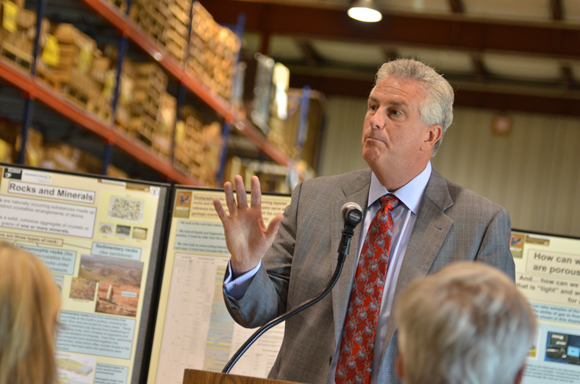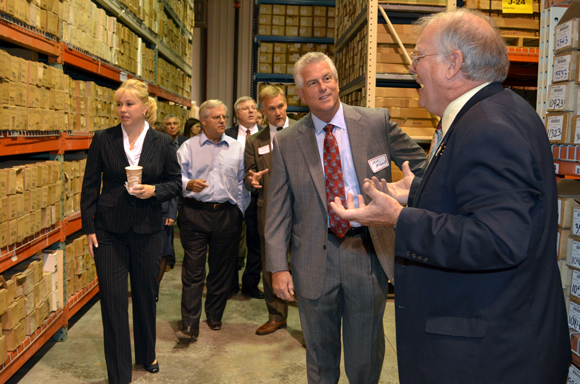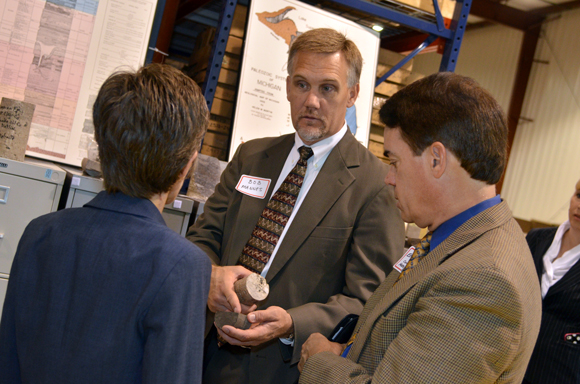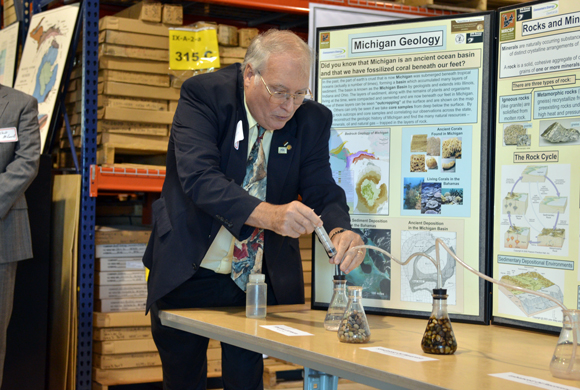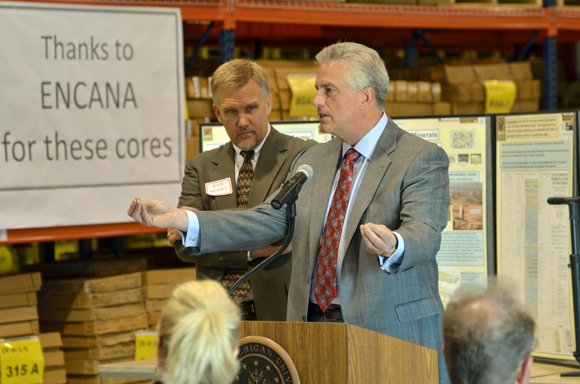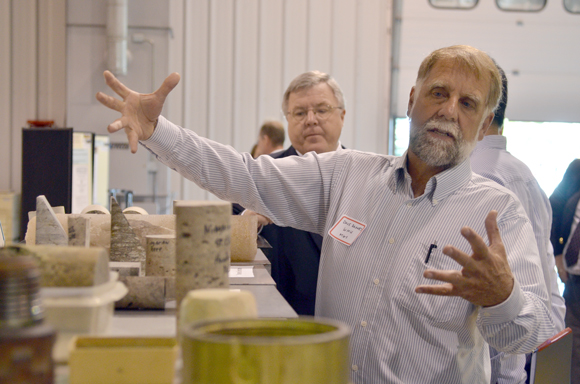New technology set to move oil from hard to get places
Is Michigan on the edge of a new oil boom? Would it be safe for a state surrounded by water and with lakes dotting the landscape? Chris Killian was on the Western Michigan University campus to find out what officials are proposing for the Great Lake State.
A 21st Century American oil boom is afoot, but instead of the bobbing pump jacks and derricks of old, a new technology is allowing for the removal of oil from places beneath the earth that previously could not be reached.
And experts believe there is a hefty supply of that yet untapped oil under the feet of Michiganders. Call it Great Lakes Gold.
Industry and government officials met on Wednesday with interested business stakeholders and members of Western Michigan University’s Geology department at the Michigan Geological Repository for Research and Education in Oshtemo Township, a facility administered by WMU. The repository houses 450,000 linear feet of core rock samples drilled from around the state.
“We’re doing a lot of specialized research studies regarding new techniques for oil drilling in Michigan,” Harrison said. “We’re the place where the information is about Michigan geology.”
Discussed was a relatively new way of extracting crude called Enhanced Oil Recovery (EOR), also known as Carbon Capture Utilization and Sequestration (CCUS), a practice where carbon dioxide is captured, pressurized into liquid CO2 and pumped into wells, displacing oil stuck between rocks and then filling in the gaps left by the escaping oil, which is pumped to the surface and collected.
U.S. Assistant Energy Secretary for Fossil Energy Charles McConnell – who praised WMU and the Kalamazoo community for their commitment to innovation – said it was a “win-win” technology, whereby CO2, a greenhouse gas, is captured and stored, removing it from the atmosphere, and the nation’s supply of domestic oil is increased. A similar technique can be employed to capture natural gas as well.
“It’s a win-win technology any way you slice it,” McConnell said. “And Michigan is poised to be a big contributor. The oil is here.”
From the 1920s to the 1980s, the state was the 13th largest producer of crude oil, the assistant secretary said. Now, he and other experts believe that Enhanced Oil Recovery technology can tap into what some believe to be upwards of 1 billion barrels of oil that could not previously be produced.
There are 2,000 oil and gas fields that could benefit from Enhanced Oil Recovery. Over the last decade, Enhanced Oil Recovery has been used in wells statewide, some by Bob Mannes, a third generation oil man and CEO of CORE Energy, of Traverse City, currently the only oil production firm to use EOR in the state.
Since the company’s founding in 2003, CORE Energy has produced 1.5 million barrels of oil using Enhanced Oil Recovery. Companies from as far away as Texas have expressed interest in investing in Michigan’s oil fields.
“We need to continue to maximize domestic sources to ensure energy security,” Mannes said.
Michigan is a lot bigger oil and natural gas producer than many may think.
Currently, the state ranks first among the 50 states for natural gas storage, 17th for oil production and 11th for natural gas production. However, Michigan only produces 5 percent of the oil and 25 percent of the natural gas that it consumes.
Nationally, Enhanced Oil Recovery is employed in the production of 5 percent of domestic oil supplies. In the future, that could shoot up to 30 percent to 40 percent and create 2.5 million to 3 million new jobs, McConnell said.
“This is unmined gold,” he said. “It’s like Saudi Arabia in 1925.”
Environmental and safety concerns
Enhanced Oil Recovery is part of the Obama Administration’s “all of the above” approach to energy independence, and a bridge that will lead the nation to a truly clean and sustainable energy portfolio that includes wind, solar and other greenhouse gas-free forms of energy, McConnell said.
But environmental groups have raised concerns over the growing use of Enhanced Oil Recovery, with particular attention being given to potential groundwater contamination from the briny, potentially toxic wastewater that is sometimes a byproduct of EOR operations.
McConnell said that of 1,200 wells where EOR has been employed in Michigan, not a single seismic incident or contamination has been seen. Unlike in Pennsylvania, where some drinking water wells were contaminated as a result of fracking operations for natural gas, Michigan had a regulatory framework in place before Enhanced Oil Recovery operations took place.
“Is it safe? Yes. Is it going to leak? No,” McConnell said, adding that the underground rock that held the yet undeveloped oil in place also acts as a bulkhead that keeps any potentially contaminated substances from migrating. “I grow weary of one person’s hypothesis (about the detrimental effects of EOR) without the data to back it up.”
“What we’re doing today should be obsolete in 10 to 15 years” as better Enhanced Oil Recovery technologies come online, he said.
There are some who want the nation to move toward a truly sustainable energy portfolio – as devoid of fossil fuels as possible – much quicker than the current pace. But McConnell said a mixed portfolio is the temporary framework that’s needed as the country moves to wean itself — albeit slowly — off of greenhouse gas-emitting fuels.
“Some people want to cross that bridge in 5 years. I see it being crossed in 50 to 100 years,” he said. “We must be effective today, tomorrow and in the future, and like any good investment profile, you need a good portfolio.”
Chris Killian is a freelance journalist based in Kalamazoo, where he’s lived full-time since graduating from Western Michigan University in 2004. He writes regularly for local media outlets and specializes in feature, environmental and political stories.
Photos courtesy Western Michigan University.
U.S. Assistant Energy Secretary for Fossil Energy Charles McConnell
Mich. Sen. Tonya Schuitmaker, Mich. Sen. Howard Walker (Traverse City); Robert Mannes, CEO of Core Energy; DOE Asst. Sec. Charles McConnell and Dr. William Harrison visit the Michigan Geological Repository for Research and Education tour the repository.
Bob Mannes
Dr. William Harrison
Bob Mannes and DOE Asst. Sec. Charles McConnell
Dave Barnes

